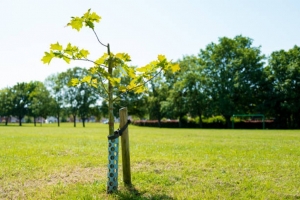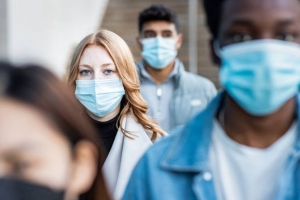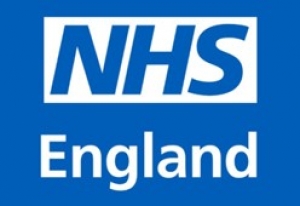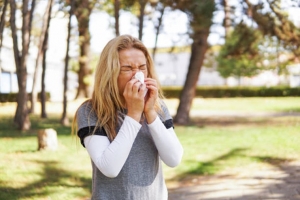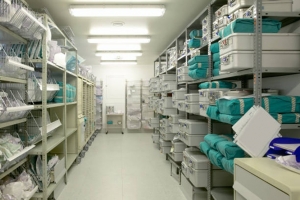Wokingham Community Plants Trees in Tribute to Covid Victims
A moving tribute is taking shape in Wokingham as residents and volunteers come together to plant thousands of trees in memory of those who lost their lives during the Covid-19 pandemic. The initiative, led by Wokingham Borough Council, marks five years since the pandemic began and aims to offer a lasting space for reflection and remembrance.
The project involves the transformation of a 7.7-hectare plot of former farmland, just north of California Country Park, into a peaceful woodland known as The Covid Memorial Woodland. More than 6,700 trees will be planted across the site, supported by the Woodland Trust’s Emergency Tree Fund. The space will include paths and wildflower meadows, creating a tranquil environment for visitors.
Laura Buck, the council’s service manager for green infrastructure, described the woodland as a symbol of “remembrance and hope”. She emphasised that the initiative is open to everyone, encouraging the community to get involved in the four-day planting effort. Two sessions are held daily, allowing people to lend a hand in this meaningful project.
"This is about more than trees - it’s about creating a place where people can pause, reflect, and remember,” Ms Buck said. The council also highlighted the project’s environmental benefits, calling it a way to give back and help address the climate emergency.
Expert Warns: Future Pandemics Inevitable Despite Progress Since Covid
Five years on from the UK’s first Covid-19 lockdown, a leading virologist has cautioned that another global pandemic is likely in the future. Professor Lawrence Young, a Worcestershire-based expert who retired from the University of Warwick in 2024, stressed that while Covid-19 is currently under control, it remains a potential threat - particularly for vulnerable individuals.
Speaking on the state of public health, Prof Young highlighted how the pandemic exposed the importance of medical innovation and global collaboration. Tools such as lateral flow tests and vaccine development proved invaluable, yet he expressed concern that financial strain on the NHS may be undermining progress in public health preparedness.
Although coronavirus hospital admissions have remained low over the recent winter, Prof Young warned that the virus is still circulating and could spark another outbreak if not closely monitored. He noted that vaccines continue to play a critical role in protecting high-risk groups, especially with updated doses tailored to new variants.
Looking ahead, the professor pointed to climate change and increased global mobility as factors heightening the risk of future pandemics. He emphasised the need for personal responsibility, such as wearing masks when appropriate, and stressed the vital lesson of not underestimating infectious diseases again.
Poorest Children Falling Further Behind Due to School Absences
Research from the Education Policy Institute (EPI) shows children from low-income families are missing more school and falling further behind. The study found that by 16, disadvantaged pupils are up to 19 months behind their peers. Education Secretary Bridget Phillipson told BBC Panorama that the pandemic had caused a "serious and profound shift" in attitudes to attendance, with lockdowns leaving a lasting impact on education.
Persistent absence rates among primary pupils in England have nearly doubled since Covid, with 15% missing at least one in ten school days. The education gap, which had been narrowing before the pandemic, is widening again. EPI analysis suggests equalising attendance could reduce the GCSE gap from 19 to 15 months. Natalie Perera from EPI stressed the link between attendance and achievement, calling for more research into why poorer children miss more school.
Experts cite poor housing and mental health as key factors. Teachers report many young pupils have delayed speech, weaker social skills, and struggle with basic learning behaviours. Professor Catherine Davies from the University of Leeds warned that many missed out on crucial early development. Intervention programmes, like those at Queen’s Drive Primary in Preston, are helping young children catch up.
The government aims for 75% of children to reach a good level of development by reception by 2028, up from 68%. However, long-term effects on attendance and attitudes remain a challenge. The Nuffield Early Language Intervention (NELI) programme is funded only until this school year, with no confirmation of future support. Phillipson stressed the importance of ensuring children get the help they need to thrive.
Streeting’s NHS Overhaul: Reform, Job Cuts & Accountability
The Health Secretary, Wes Streeting, has acknowledged that his plans to reform the NHS could cause some disruption but insists the changes will bring long-term improvements. As part of the overhaul, the government will abolish NHS England, aiming to reduce inefficiencies and redirect funds towards frontline healthcare. The transition, expected to take two years, is projected to save hundreds of millions of pounds. Streeting defended the decision, arguing that NHS England had become a barrier between ministers and responsibility, and that cutting bureaucracy was necessary to improve patient care.
Under the new structure, the Department of Health and Social Care (DHSC) will take direct control of the NHS, eliminating what the government describes as unnecessary layers of administration. While the reorganisation will not impact access to free healthcare, it will lead to significant job losses, with around 9,000 administrative roles expected to go. Richard Meddings, chair of NHS England, accepted the decision but stressed that ultimate accountability will now rest solely with ministers, leaving them directly responsible for the success or failure of the reforms.
Streeting has signalled that this is just the start of a wider effort to streamline the health service, warning that excessive regulation is stifling efficiency. He has tasked NHS England’s new chair, Penny Dash, with reviewing bureaucratic processes to identify further cuts. While he pledged to support affected staff, he made clear that simplifying NHS management was essential to its future success. NHS leaders have expressed concerns that the current system overwhelms them with conflicting directives, something Streeting hopes to resolve.
The opposition parties have responded cautiously to the changes. The Conservatives have supported the shift in responsibility to ministers but warned that Labour will now have nowhere to hide if problems arise. Meanwhile, the Liberal Democrats have urged the government to ensure the shake-up does not harm patient care and called for greater attention to be given to social care reform.
Hull’s Youth Volunteering Programme Expands Across the Humber
A successful youth volunteering scheme in Hull, which has helped young people build careers in the NHS, is expanding across the region. The Hull Hospitals’ Young Health Champions programme, which has supported thousands of aspiring healthcare professionals over the past decade, has now been rebranded as the Humber Health Champions. Open to those aged 16 to 25, the scheme provides hands-on experience in clinical settings, helping volunteers explore different healthcare roles before committing to a career path.
Holly Giles, now 22, joined the programme at 17 and credits it with helping her secure her ideal job as a staff nurse in Hull Royal Infirmary’s Emergency Department. Initially considering paediatric nursing, she was able to gain experience in various healthcare environments before realising her true passion lay in adult nursing. Reflecting on her journey, she explained that volunteering helped her develop vital communication skills and gain a clear understanding of the hospital environment.
Since launching in 2014, the programme has guided more than 2,700 young people into healthcare careers, including roles as doctors, nurses, and emergency care workers. Many participants have gone on to further training and permanent NHS positions, demonstrating the scheme’s success in nurturing future healthcare professionals.
Rachel Hardcastle-Pearce, head of voluntary services for NHS Humber Health Partnership, highlighted the scheme’s impact, stating that it provides young people with invaluable real-world experience beyond the classroom. She emphasised that by encouraging local talent to pursue NHS careers, the programme is playing a key role in strengthening the region’s healthcare workforce for the future.
New Discovery Uncovers Hidden Immune Defence with Potential for Antibiotics
Scientists have uncovered a previously unknown function of the immune system, revealing a hidden source of potential antibiotics within the body. Researchers in Israel have discovered that the proteasome - a structure found in all cells - has a secret ability to produce bacteria-killing compounds. This breakthrough not only reshapes understanding of how the body fights infection but also presents a fresh avenue for tackling antibiotic resistance, a growing global health crisis.
The proteasome is primarily known for breaking down old proteins into reusable components. However, new findings published in Nature show that when a cell detects bacterial infection, the proteasome changes its function. Instead of recycling proteins, it repurposes them into antimicrobial molecules capable of attacking and destroying bacteria. Professor Yifat Merbl, from the Weizmann Institute of Science, described the discovery as a "novel mechanism of immunity" that occurs throughout the body, generating an entirely new class of natural antibiotics.
Researchers tested these newly discovered compounds on bacterial infections in laboratory conditions and on mice with pneumonia and sepsis. The results were comparable to existing antibiotics, suggesting significant potential for future treatments. Furthermore, experiments showed that disabling the proteasome made cells far more vulnerable to bacterial infections, reinforcing its crucial role in immune defence.
While the path to developing new antibiotics from this discovery remains long, scientists are optimistic. Dr Lindsey Edwards, a microbiologist at King’s College London, highlighted the significance of this finding, suggesting that using naturally occurring human compounds could simplify drug development. With antibiotic resistance on the rise, this unexpected internal defence mechanism could be a game-changer in the fight against superbugs.
New £6.5m Research Hub to Drive NHS Sustainability
A new £6.5 million research hub, spearheaded by the University of Exeter, will explore innovative ways to help the NHS cut its carbon footprint. It is one of seven centres across the UK benefiting from a £42 million government investment aimed at tackling different net-zero challenges.
The Exeter-led hub will collaborate with partners across the country to develop sustainable solutions that support the NHS in achieving its net-zero target by 2045. According to the centre’s director, Professor Ed Wilson, the research will examine the entire patient journey within the NHS and social care to pinpoint key areas of high carbon emissions and find ways to neutralise them.
Although the NHS has made significant strides in reducing its carbon footprint, with an 80% reduction in direct emissions from 1990 levels expected by 2030, challenges remain. Emissions from transport, waste, and the supply chain - such as the production of medicines, medical devices, and hospital essentials - have continued to rise. Professor Wilson emphasised that the project goes beyond cutting travel and waste, focusing on helping NHS suppliers redesign their processes to lower emissions.
The initiative will bring together leading organisations in the South West, including the Royal Devon University NHS Foundation Trust, Cornwall Partnership NHS Foundation Trust, and Volunteer Cornwall. Adrian Harris, chief medical officer at the Royal Devon, highlighted the hub’s role in advancing pioneering research, while Dr Beth Chapman from Cornwall Partnership NHS Foundation Trust stressed the importance of sustainability in securing a resilient healthcare system for the future.
Covid Inquiry to Examine Billions Spent on Medical Supplies
The public inquiry into the UK’s Covid response is set to begin a new phase on Monday, focusing on how billions of pounds were spent on medical equipment during the pandemic. Over the next four weeks, the hearings will investigate the procurement and distribution of PPE, test-and-trace systems, hospital supplies, and vaccines - an expenditure estimated at £48bn. Transparency International has reported that nearly 10% of contracts were awarded to firms with ties to the Conservative government in power at the time.
A key area of scrutiny will be the controversial "VIP lane," introduced in April 2020 to fast-track PPE procurement for suppliers recommended by ministers, MPs, and senior officials. Government records show that companies in this priority lane were ten times more likely to secure contracts than standard suppliers. The inquiry will examine the effectiveness of spending controls, the extent of fraud, and whether appropriate measures were taken to prevent financial mismanagement.
However, bereaved families have criticised the inquiry, claiming it is failing to properly scrutinise suppliers. They argue that without hearing directly from companies awarded contracts, there will be no full accountability for potential mistakes or misconduct. Lobby Akinnola, who lost his father to Covid, questioned how lessons could be learned if suppliers were not required to give evidence.
The inquiry has defended its decision, stating that its role is to assess the government’s handling of procurement rather than investigate individual companies. Meanwhile, sensitive evidence related to PPE Medpro - a supplier linked to Baroness Michelle Mone - will be examined in private to avoid interfering with ongoing legal proceedings. Later this year, the inquiry will move on to assess the pandemic’s impact on social care, test-and-trace, children, and the economy.


